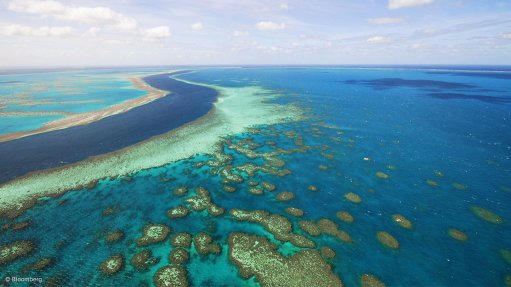
Photo by: Bloomberg
PERTH (miningweekly.com) – The Queensland Resources Council (QRC) has welcomed the Australian government’s progress report to the World Heritage Committee on the state of conservation of the Great Barrier Reef, saying that it confirmed the real threat level to the reef.
“The State Party Report again documents the real threats to the reef as being extreme weather events, the potential effects of climate change, the Crown-of-thorns starfish infestations, and nutrient and sediment run-off from land clearing and broad-scale agriculture,” said QRC CEO Michael Roche.
“Flying in the face of the hysterical reaction from some quarters to the granting on Friday of a dredging permit at Abbot Point, the State Party report identifies impacts from port development and dredging as minor, temporary and localised.”
The report, released by federal Environment Minister Greg Hunt, demonstrated both state and federal efforts to better manage and protect the Great Barrier Reef.
“The government is implementing important initiatives such as our Reef 2050 Plan, Reef Trust, and funding vital projects such as Crown-of-thorns starfish eradication and the Gladstone Healthy Harbours Partnership,” the Minister said.
“The federal government is working closely with Queensland to help protect this Australian icon for future generations.
“The report shows that the Great Barrier Reef’s outstanding universal value and integrity remain largely intact and Australia has made substantial progress and commitment in responding to the requests of the World Heritage Committee.”
Concern for the Great Barrier Reef flared up again at the end of last week after the Great Barrier Reef Marine Park Authority’s grant of dredge permits to expand the Abbot Point Port.
The dredge permits would allow the North Queensland Bulk Ports Corporation to dispose of about three-million cubic meters of dredge spoil at a deep-water location offshore Abbot Point, subject to strict environmental conditions.
However, Hunt pointed out on Monday that the scale of the new plans for Abbot Point Port were one-twelfth of the size of those proposed under the previous state and federal labour agreements.
Meanwhile, Queensland Minister for Environment and Heritage Protection Andrew Powell said the Queensland government was equally confident that it would meet the World Heritage Committee expectations regarding reef management.
“The Queensland government has carried out a significant amount of work to help improve the health of the reef and protect it in the future,” Powell said.
“We have established the Gladstone Healthy Harbour Partnership and released our draft ports strategy and the strategic coastal zone assessment for public consultation.
“We are also working with farmers to reduce run-off onto the reef through our Best Management Practice programmes and we are seeing improvements to water quality in our Reef report cards.”
The government has also committed $140-million for a reef programme over the next five years to improve the quality of water flowing into the Great Barrier Reef lagoon and enhance the reef’s resilience.